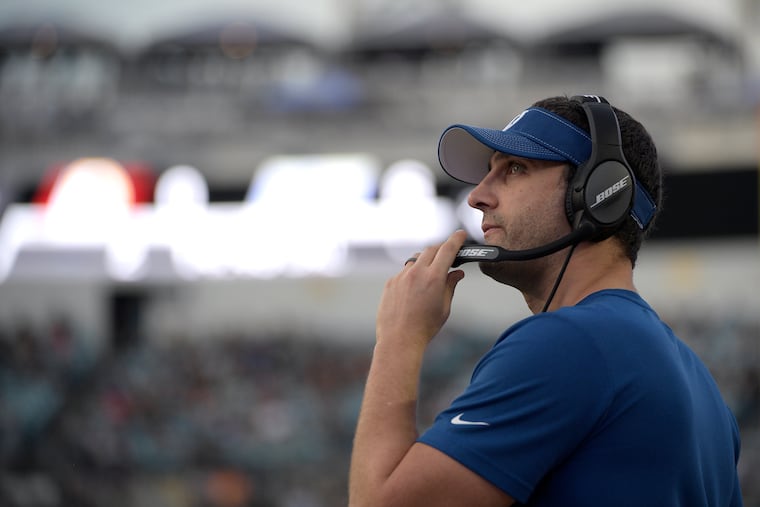How Eagles coach Nick Sirianni’s background led to his ‘multiple’ scheme
Part of the reason Sirianni landed the job with the Eagles was his “multiple” offensive scheme, which he’s shown a willingness to adapt for the team's personnel.

Nick Sirianni believes he’s the product of all the coaches he’s been associated with over the years.
The Eagles head coach, like most in his position, has borrowed some element from each of the leaders he’s either played for or coached under in the past. His history includes his father and two older brothers, who collectively have spent decades in the high school and college ranks; his college coach at Mount Union; and a cast of NFL coaches that includes Frank Reich, Romeo Crennel, and Todd Haley.
“You take a little bit of each coach that you’ve been around, and make yourself out of that,” Sirianni said during his introductory news conference on Friday. “You take the good, you take the bad, and you make the best out of you from those people.”
Part of the reason Sirianni landed the job with the Eagles from among a wide pool of candidates was his “multiple” offensive scheme, which he’s shown a willingness to adapt for the team’s personnel.
This approach is more akin to one you’d see from a high school or college coach, who has less control over the players brought in each year. Iowa State offensive coordinator Tom Manning, who played with Sirianni at Mount Union and coached with him in Indianapolis in 2018, believes the Eagles’ coach adopted this style because of his family ties and college experience.
“Going back to our college days, our belief has always been, ‘It’s still about the players,’” Manning said. “Our college football coach, Larry Kehres, had a profound effect on a lot of us. I think his philosophy is [that] it’s about the players, which dictate the formations that you get into and ultimately the plays that you run.
“High school coaches, you don’t get to pick your players,” Manning added. “In high school, those guys have to adapt every year based on who they have. I think the sign of a good offense is having flexibility and a system in place that you’re able to find different ways to create matchups and utilize some of your players that maybe you feel have this strength and that strength, and maybe find different ways to create matchups and utilize their strengths.”
During Sirianni’s tenure, Indy started with Andrew Luck at quarterback in 2018, transitioned to Jacoby Brissett after Luck retired before the 2019 season, and then tailored its offense to an aging Philip Rivers last year.
The fundamentals of Sirianni’s offense will likely carry over a handful of concepts that Doug Pederson ran during his time in Philly, particularly double-tight-end formations and run-pass options. Still, Sirianni and Reich’s offenses looked different in each of his three years there.
Brissett had the second-longest average time to throw in 2019 at 2.93 seconds, but Rivers was one of the quickest in the league the following year, averaging 2.52 seconds per throw. The Colts used a heavy amount of play-action with Brissett, calling 30% of his pass plays off of run fakes, while both Luck and Rivers hovered closer to 20%.
“Those three teams looked different,” Sirianni said. “They were all different in their own ways of how we attacked defenses and how we played the game. I think that’s a sign of a good coach, that you’re going to change based off of your personnel. It’s an ever-changing offensive philosophy.”
The time-to-throw aspect of the Colts’ offense could have a positive effect on Carson Wentz. Like Sirianni, Doug Pederson tried to tailor the Eagles’ offense to Wentz’s strengths last season, allowing him more opportunities to take shots down the field. It resulted in Wentz being among the league leaders in categories such as time to throw and percentage of passes of 20 yards or more. But it also led to the 28-year-old quarterback’s sharp regression, leading to his benching late in the season.
The deep shots could still be a part of Sirianni’s offense, but, as Manning explains, there will likely be more quick-game concepts in order to get the ball to players out in space.
“With Nick, it’s going to be about, ‘How do we find ways to get our playmakers the football in whatever fashion that needs to be?’” Manning said. “He will find a way to make sure that the playmakers are involved in the game.”